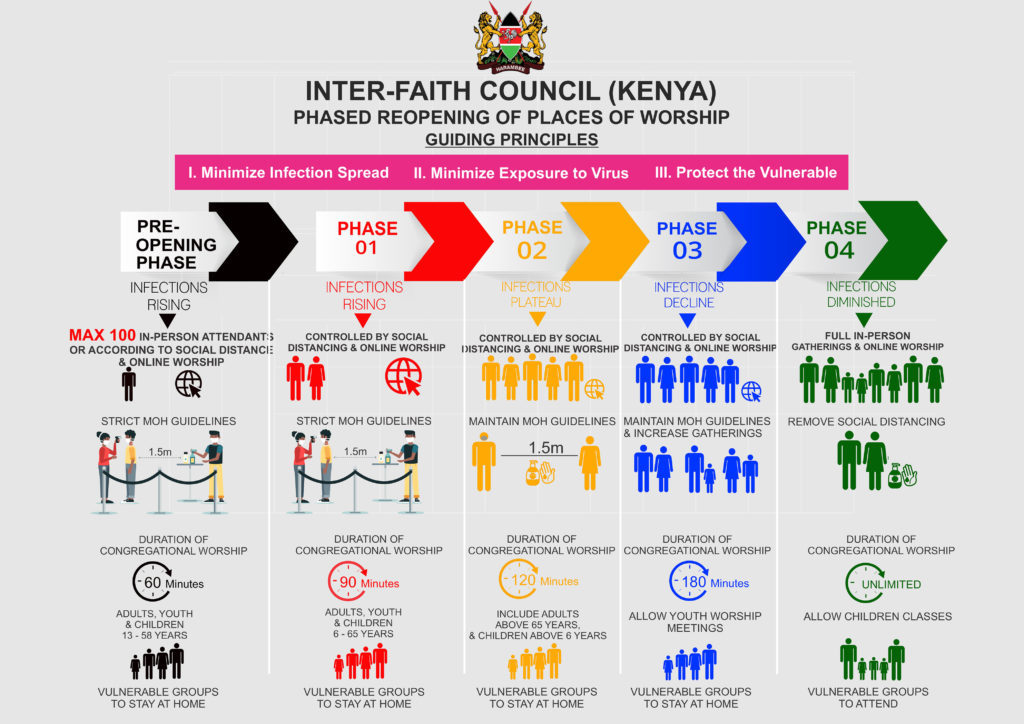KENYA: Interfaith Council for Coronavirus Pandemic Response Reviews Guidelines as New Cases Rise

Sr. Jecinter Antoinette Okoth, FSSA
The duration of public worship and age limit for worshippers has been reduced by the Interfaith Council for Corona Pandemic Response following the nation’s resurgent Covid-19 infections and deaths which has raised
In the statement after revising the last guidelines for the phase two reopening of public worship which allowed a duration of 2 hours for worship with the elderly over 65 years and young children under 6 years.
The body that was created mid-June by the President and mandated to oversee the resumption of public worship in the country, has fear in a looming second wave.
“Time limit will be strictly 90 minutes, and the age limit will be over 6 years and under 65 years,” Interfaith Council members highlighted expressed concern on the laxity of the government and the citizen to help curb the spread of Coronavirus, hence reviewing downwards the guidelines issued early last month.
“We are concerned and disheartened by the rising numbers of infections in the country as we continue to lose our beloved family members, friends and neighbors. It is worrying that despite the rising cases, the country appears to be losing focus of the importance of combating this pandemic,” reads the Interfaith Council’s collective statement signed by the Vice-Chairman Rev. Connie Kivuti Thursday, November 26.
According to the Interfaith Council members which disclosed that in the last one month the positivity rate has fluctuated between 13% to a high of 20%, the implementation of the revised guidelines should commence immediately as from Friday, November 27.
The Interfaith Council has further expressed concern about the conduct during gatherings such as weddings and funerals which gradually change to become political meetings; at the same time, laxity during political gatherings in adhering to the Ministry of Health (MoH) guidelines.
“These meetings are especially of concern as they pose great danger of being super-spreader events,” read the statement.
Rev. Kivuti insists on behalf of the members, “The number of those attending weddings should be strictly 50,” The number of those “attending the funerals will be 100, with only 15 allowed at the graveside, while duration of burial must not exceed 1 hour and no food shall be served in funerals.”
They urge Religious leaders for cooperation and collaboration in implementing the set guidelines for worship and other religious rites noting that “this not only protects the people attending the gatherings but the vulnerable people who don’t attend but with whom our congregants get in contact with after worship.”
Reiterating the seriousness of the pandemic in the country, the Interfaith Council members said, “Our dear brothers and sisters, the Coronavirus pandemic is the most serious and existential threat not only to the global community but especially for us. Our country has the sixth highest infections in Africa and these are rising fast. Unfortunately, our political elite are not focused on the health crisis but on political issues.”
The Council members further request all citizen to seriously observe the guidelines as given by the Ministry of Health of hand washing, social distancing, and wearing of masks as they “encourage dialogue between the Ministry of Health, County governments and health workers to resolve the differences that may hinder service provision to Kenyans.”
They appreciated the work done by all health practitioners and asked for continued prayers for the many people affected and infected by Covid19, especially the Chairman of the Interfaith Council Archbishop Anthony Muheria of Kenya’s Nyeri Archdiocese who is recovering.
As “Covid-19 pandemic infections and deaths continue to rise in our country, we thank and appreciate our frontline health workers who continue to work tirelessly in fighting this pandemic. We thank God for keeping, protecting and watching over us as a country despite the rising numbers,” the presser concludes.


